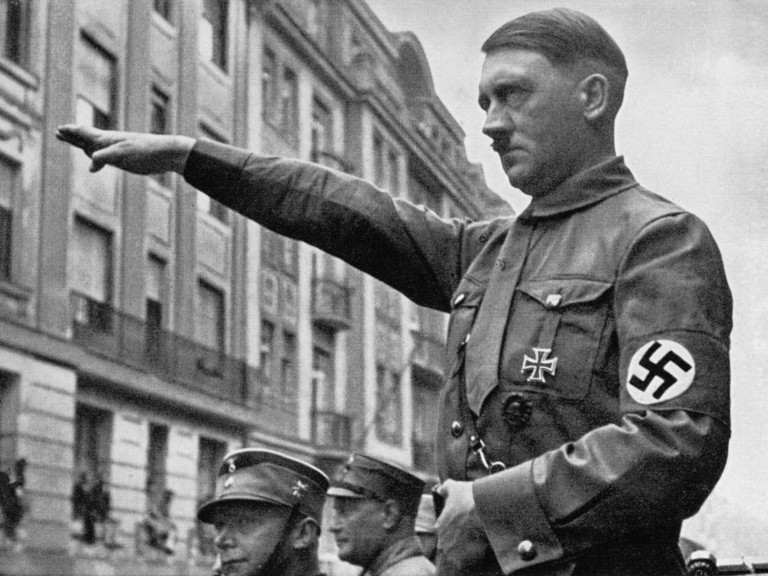As everyone knows, last November 8th was an historic election in the United States, but what many might not know is that it is also an important day in history back in 1923. An event known as Beer Hall Putsch.
Beer Hall Putsch
Beer Hall Putsch was a failed coup attempt by Nazi leader Adolf Hitler. He and other Kampfbund leaders attempted to seize power in Munich on November 8th, 1923. Nearly two thousand men marched to the center of Munich and battled police which resulted in the death of 16 Nazis and several policemen. Two days later, Hitler was arrested and charged with treason. Had it not been for the Beer Hall Putsch, Hitler very likely never would have come into the public eye of the German people. He stood trial for his treason and over a twenty four day trial, which was widely publicized, he used his publicity as a chance to let Germany know about his nationalistic views. Hitler was found guilty and sentenced to five years in Landsberg Prison during which time he wrote Mein Kampf; his autobiography.
Damage and Control
It has been strongly debated as to what led to the rise of power and the damage that was Adolf Hitler. I feel the reality is, a combination of things many of which were simply world economic circumstances that Hitler just happened to be in the right place at the right time:
- Hitler was extremely distraught over Germany losing during World War I
- After losing his father Alois in 1903, Adolf became very close to his mother. After losing her to breast cancer in 1907 he was never the same.
- An artist, Hitler applied numerous times to various art schools but was continually denied. This built up resentment and a desire to show he was not the failure he appeared to be.
- He developed a fondness for German nationalist Georg Ritter von Schönerer who promoted anti-Semetism, anti-Slavism and anti-Catholism.
- The general morality of Germany was depressed and badly needed a boost.
- The Great Depression provided Hitler with an opportunity to unite the people of Germany.
This along with many other influences may have led to Hitler’s attitude on the world around around him and his strong anti-Semitism beliefs. In 1920, Hitler announced a 25-point program for the National Socialist German Worker’s Party (NSDAP) which would later become known as the Nazi party. In October of 1920, the party was officially renamed to the Sturmabteilung or SA.
In 1928, feeling that Germans needed to know more about his goals, Hitler wrote a second book called Zweites Buch which was released posthumously.
On October 24, 1929 the United States stock market crashed, an event that was felt world wide. In Germany millions were thrown out of work and several major banks collapsed. It was the perfect opportunity for Hitler and the NSDAP to gain support for their party and they promised to repudiate the Versailles Treaty as well as create jobs for the German people. In January 1932 Hitler gave a speech for the Industry Club in Düsseldorf, winning him support from many of Germany’s most powerful industrialists. Hitler adopted the slogan “Hitler über Deutschland” (“Hitler over Germany”) for his campaign for president. Although he lost to Hindenburg, he gained a strong following and respect as a political force among the people.
Hindenburg, a strong opponent of Hitler’s views reluctantly agreed to appoint Hitler as chancellor after two parliamentary elections had not resulted in the formation of a majority government. In being appointed as chancellor, Hitler had insisted on the ministerial positions as a way to gain control over the police in much of Germany so Wilhelm Frick was named Minister of the Interior, and Hermann Göring was appointed Minister of the Interior for Prussia, securing a total of three posts for the NSDAP.
In 1933, the new Reichstag was created with an opening ceremony at the Garrison Church in Potsdam. This “Day of Potsdam” was held to demonstrate unity between the Nazi movement and the old Prussian elite and military. That year Hitler’s government brought to vote the Gesetz zur Behebung der Not von Volk und Reich (“Law to Remedy the Distress of People and Reich”), giving Hitler’s cabinet the power to enact laws without the consent of Reichstag for four years. Using provisions of the Reichstag Fire Decree, eighty-one communist deputies (and strong opponents of the Nazi party) were arrested which prevented several Social Democrats from attending the vote on the Act.
On March 23, 1933, the Reichstag assembled at the Kroll Opera House under turbulent circumstances. Ranks of SA men served as guards inside the building, while large groups outside opposing the proposed legislation shouted slogans and threats towards the arriving members of parliament. The position of the Centre Party, the third largest party in the Reichstag, was decisive. After Hitler verbally promised party leader Ludwig Kaas that Hindenburg would retain his power of veto, Kaas announced the Centre Party would support the Enabling Act. The Act passed by a vote of 441–84, with all parties except the Social Democrats voting in favour. The Enabling Act, along with the Reichstag Fire Decree, transformed Hitler’s government into a de facto legal dictatorship. [1]
Realities
The reality is, Hitler’s rise to power did not come overnight. He worked very hard to not only gain control, but to slowly eliminate those that opposed his views and ideals. I do not personally believe that any country ever decides to elect a dictator. A dictator slowly takes control at times when control is needed and opportunities present themselves. By the time the public realizes that there is a dictator in control of their homeland, it is too late.

